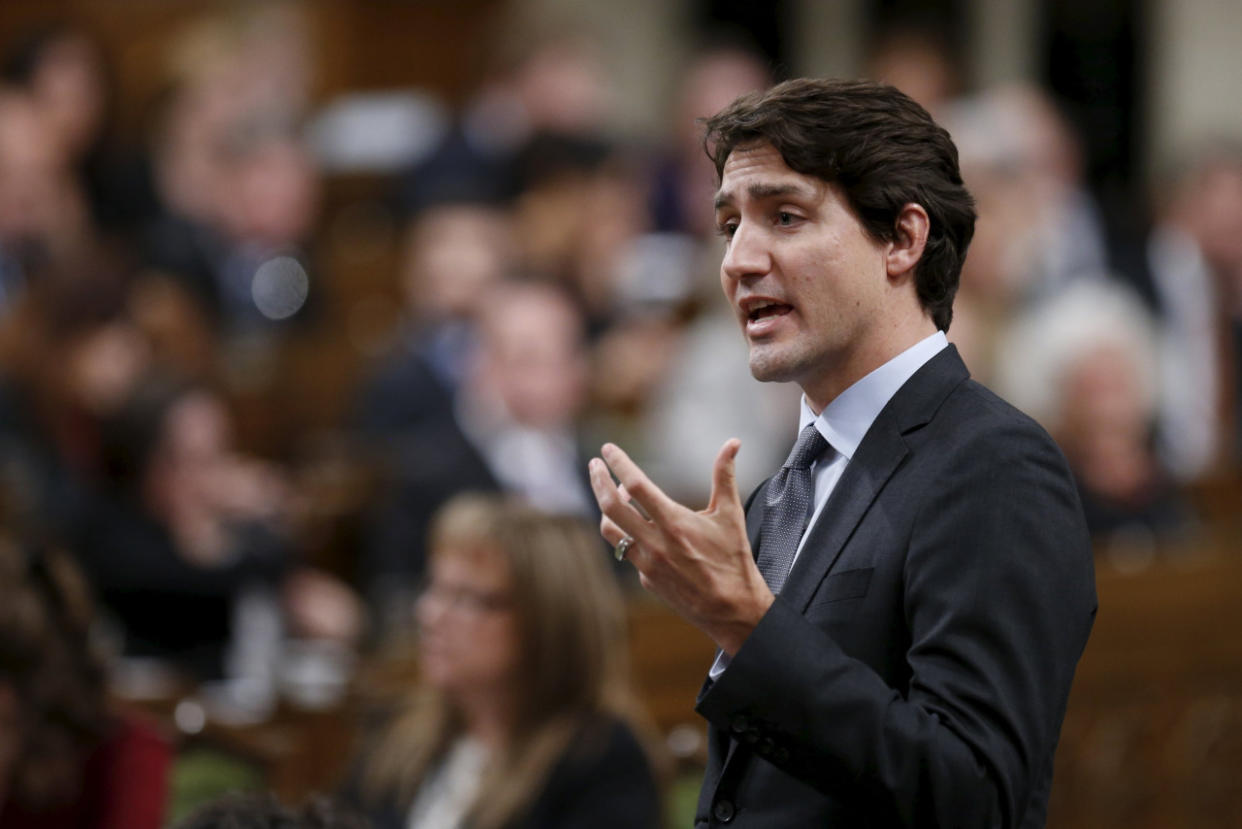 Canada Politics
Canada PoliticsAs Trudeau marks 100-day milestone, pundits assess his so-so performance

[Prime Minister Justin Trudeau speaks during question period in the House of Commons on Parliament Hill in Ottawa on Feb. 2, 2016. REUTERS/Chris Wattie]
It’s been nearly 100 days since Justin Trudeau has been prime minister of Canada and so far, so-so, some pundits suggest.
A recent poll found a high rate of approval among Canadian voters for Trudeau and his team but the Liberals did stumble out of the gate, says one of the co-founders of Democracy Watch.
“They have broken a few promises,” says Duff Conacher, also a visiting professor at the University of Ottawa. “So that’s not a good start.”
“Baiting” voters with false promises, such as bringing 25,000 Syrian refugees to Canada by the end of 2015, can win an election, Conacher tells Yahoo Canada News, but it’s a risky game.
“Each scandal will chip away at the trust that they’ve taken 10 years to win back.”
A couple of days before the Oct. 19 federal election, Trudeau told reporters what the first 100 days of a Liberal government would look like.
“As I’ve said from the very beginning, my style of leadership is to bring people together,” Trudeau said.
Indeed, the Liberal government has been big on consultation since taking office but “eventually you have to make decisions and you rarely can reach a compromise where everyone is pleased,” says Conacher, offering oilsands pipelines as an example.
Trudeau promised a revised environmental review system for controversial oil pipeline proposals like Kinder Morgan’s Trans Mountain project and TransCanada’s Energy East.
But both projects are already before the National Energy Board and the revisions to the review system announced last week did little to appease critics of the process.
On other issues:
Taxes: Trudeau promised the very first legislation the Liberals would put forward would be to lower taxes for the middle class and raise them for the wealthiest Canadians. Done.
Refugees: The new goal is 25,000 refugees by March.
ISIS: Canadian jets are still in Iraq and Syria, despite a promise to withdraw them from the U.S.-led coalition combat mission.
Electoral reform: Trudeau appointed Maryam Monsef to head an all-party committee to come up with recommendations within 18 months.
Missing and murdered indigenous women: The Liberals have announced a long-sought public inquiry. Consultation on the process is underway.
Legalization of marijuana: Still illegal.
Climate change: The Liberals have renamed the ministry to Environment and Climate Change Canada and signed the Paris climate change agreement but so far, no new emissions targets or emissions control measures.
Still, a poll by Abacus Data last month found that 53 per cent of those surveyed approved of the federal government’s performance so far.
“To put this in context, at no point during 2015 did the Harper government find an approval rating higher than 37 per cent,” says the online poll of 1,500 Canadians conducted the second week of January.
Even 14 per cent of those who said they voted Conservative approved, as well as 57 per cent of those who voted for the NDP. Overall, just 25 per cent of respondents disapproved of the government’s performance so far.
“For the most part, the majority of Canadians approved of the job that the federal government is doing so far,” says David Coletto of Abacus Data.
In particular, Trudeau’s openness, his promise to work with provincial and municipal leaders and his general approach to his job have won voter approval.
“A lot of things that the previous prime minister, Mr. Harper, was criticized for, we see a significant change, a different approach and they’re reacting positively to that,” Coletto says.
Trudeau’s worst performance in the poll was on dealing with the Islamic State. Even on that, though, just 34 per cent gave him a poor rating.
Of course, other studies have found that Harper had similar numbers when he first took office in 2006.
“Any new government is going to get I think the benefit of the doubt from voters. Now the challenge for Mr. Trudeau and the new government is keeping Canadians happy,” Coletto says.
The upcoming federal budget could be the first real challenge. With an ailing economy, a faltering dollar and instability in oil prices, the next 100 days are unlikely to be as calm as the first 100, says Geneviève Tellier, a professor of political studies at the University of Ottawa.
“We know they’re not able to fulfil all their promises; either they run a higher deficit than promised or, if they stick to a $10-billion [a year] deficit, they’ve got to cut other promises,” she says.
The Liberals faced just two weeks of sitting in Parliament in the first few months.
“Now that Parliament is back, we want to see bills, we want to see government initiative, where are we going and that kinds of thing,” Tellier says. “So I think the real work starts now for Mr. Trudeau.”


